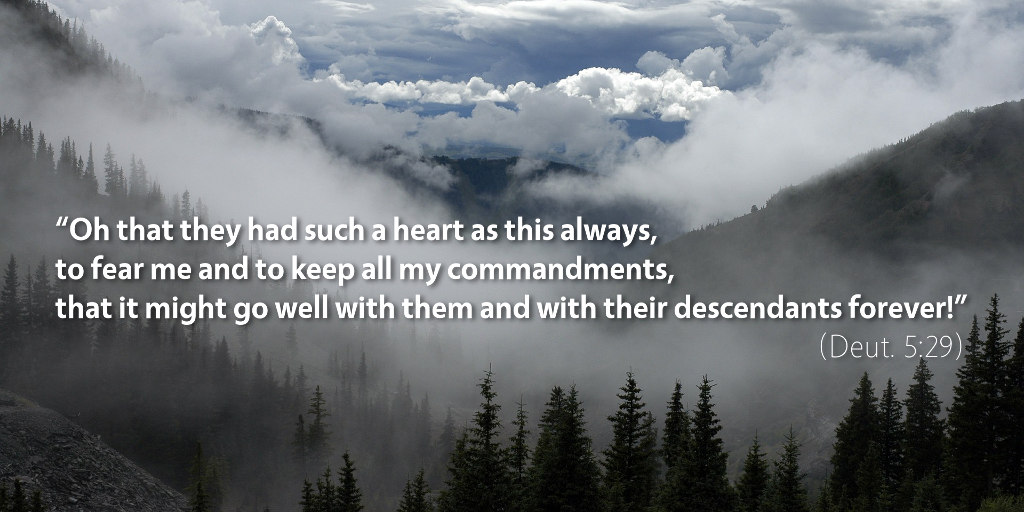Bible Readings for June 1st
Deuteronomy 5 | Psalm 88 | Isaiah 33 | Revelation 3
In Deuteronomy 5, Moses does not simply repeat the Ten Commandments, but he also reminds Israel of what their response had been at the time when Yahweh had given them the Ten Commandments: fear and reverence. When Yahweh appeared at Mount Sinai to give his law, Israel was terrified that they would be struck down by Yahweh’s holiness for their sinfulness, so they pleaded for a mediator (Deut. 5:24–27).
Yahweh, for his part, is pleased with the response of his people: “I have heard the words of this people, which they have spoken to you. They are right in all that they have spoken. Oh that they had such a mind as this always, to fear me and to keep all my commandments, that it might go well with them and with their descendants forever!” (Deut. 5:28–29). Notice the first thing that Yahweh approves of in Israel’s response: that they feared him when he revealed his law to them.
We might think that fear of the Lord is a bad thing. Shouldn’t the goal be to love God and to feel close to him? Doesn’t God want to make us feel good rather than bad? Not at all—or, at least, not at first.
Eugene Peterson offers a helpful insight into what it means to speak of the fear of the Lord in his book Christ Plays in Ten Thousand Places:
[Fear-of-the-Lord] means far more and other than simply being scared. But, and here’s the thing, it includes all the emotions that accompany being scared—the disorientation, the not-knowing what is going to happen to me, the realization that there is far more here than I had any idea of. And the “more and other” is God. When that happens, we begin to get in on the fear-of-the-Lord.1
This story in Deuteronomy 5 is such a remarkable picture of how the gospel works in our lives. When God, through his Spirit, brings us to recognize the full extent of our guilt before his holiness, we are undone—disoriented, not knowing what will happen to us, and realizing that we have spent our lives trifling with something far greater than we had ever imagined.
And only once we are at that point, undone in the presence of Yahweh’s holiness, will Yahweh’s Spirit cast light on our mediator—a better mediator than even Moses had been. Then, the Spirit urges us to flee to Christ for refuge, trusting in his shed blood to atone for our sins and for his righteousness to cover us so that we might escape the wrath to come (Matt. 3:7).
Today, lift your head from the distractions of this world to gaze upon the terrifying holiness of God—not so that you may simply become scared, but so that you may plead for the perfect mediation of Jesus Christ.
1 Eugene Peterson, Christ Plays in Ten Thousand Places: A Conversation in Spiritual Theology (Grand Rapids, MI: William B. Eerdmans Publishing Company, 2005), 122.
Podcast: Play in new window | Download (5.1MB) | Embed
Subscribe: Apple Podcasts | RSS | More

Scripture quotations are from The Holy Bible, English Standard Version copyright © 2001 by Crossway Bibles, a division of Good News Publishers. Used by permission. All rights reserved.


